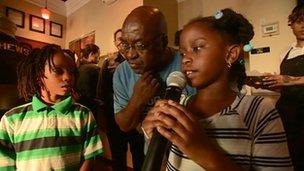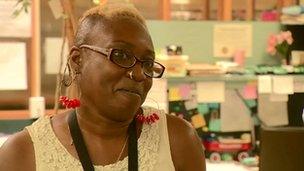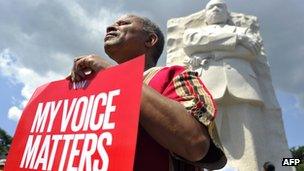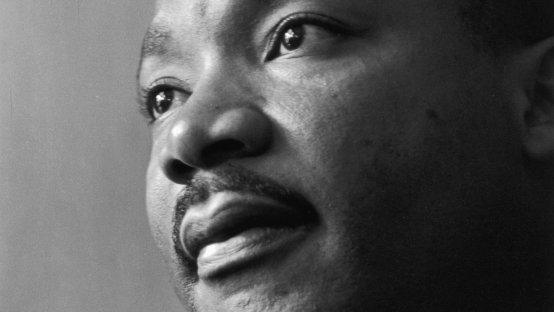Martin Luther King's Dream yet to become reality in US
- Published
- comments
Some African-Americans still face discrimination, as Mark Mardell reports
In south-east Washington DC, in a bar on Martin Luther King Jr Avenue, two very impressive children are showing off their knowledge in a dazzling performance.
The questions are rapid and their answers even snappier.
They rattle off the names of presidents, the highest mountain and the deepest lake, but there is a persistent theme across the questions and answers:
The date of Martin Luther King Jr's assassination, the date of Malcolm X's assassination, the date the first black man became the heavyweight champion of the world, the date of Alabama's violence in Selma and the bombing in Birmingham.
Here in Anacostia, like other predominantly black areas, people don't want their kids to forget history or how hard the struggle for civil rights has been.

The children are just the opening act - the main show is a documentary on the civil rights movement. It's just one event among many leading up to the 50th anniversary of the March on Washington, where King made his I Have a Dream speech.
But no-one in the bar thinks the battle has been won. No-one here doubts that racism is still a reality in the United States.
"Until you have lived the life that we lived as Afro Americans, it's hard to get over when it's constantly in your face," Liz Floyd tells me.
"Even the ones that think they've arrived - you can't arrive when it's constantly in your face, who you are not.
"Athletes make it, they think they've got it and then they find out they're just a black guy with a lot of money and as soon as you get in some problems and trouble everyone desecrates you."
Davina Calahan has just come home after taking a master's degree in Massachusetts, where she says she experienced racism.
"Even with our own people of our own colour it exists," she says.
"They vote for Obama just 'cause he's black and one thing Dr King said - he said, 'I want my children to be judged by the content of their character not the colour of their skin'.
"So even our own people, we judge Obama 'cause he's black and voted for him because he's black, not because of the content of his character."
Stark numbers
King's dream may not have become reality, even with the election of a black president - perhaps it never will be complete. But it is certainly true that some elements of the African-American nightmare are over.
Once, by law, black people were separate and unequal, segregated throughout public life.
Today the river that runs through the US capital city can still feel like a sharp dividing line. On one side, the White House, Capitol Hill and an increasingly prosperous city where areas that were once ghettos are now gentrified, full of smart restaurants and bars.
But over the river in south-east Washington, where more than 90% of the population is African American, it's a very different story.
To many whites, it is a no-go area. I have lost count of the times I have been warned to stay away. Despite some determined efforts, improvements and a fierce resilience, it remains rundown and poor.
The unemployment rate for whites in Washington DC is 3.5%. The official statistic of black unemployment here is 22%, although some say it is really much higher.
In the US as a whole the figures are stark: average unemployment: 7.4%, black unemployment: 12.6%; median income: $50,502 (£32,495), median black income: $33,460; national poverty rate: 15%; black poverty rate: 27.4%.
And of 1.5 million Americans in jail, 38% are African American though black people only constitute about 13% of the US population.
Some, of course, would say this is about economics, not race, and while the disparity has a lot to do with history and culture it is not the result of discrimination.
They would get short shrift in this side of town.
Going backwards?
At Bread for the City, I watch grateful customers collect free cans of food - they are offered beans or corn, ham and fruit juice.

Judith Hawkins says many people mistake President Obama for a racial "panacea"
I'm told this service is vital - food stamps run out at the end of every month and this service helps fill the gap. People here are often not destitute, just the working poor and retired on an inadequate pension.
Evelyn Brown is 80 and attended the famous march 50 years ago. She used to be a nurse and has worked all her life but finds it hard to make ends meet.
"It seems like everything is going backwards, 'cause like I said I came up the ranks, the hard times, so therefore I can see what's going on now," she says.
"Really it is a struggle, it's a terrible struggle."
Above one of the workers' desks here is a poster about Trayvon Martin.
The acquittal of his killer, found not guilty of murder, shocked and disappointed many in this part of town.
The introduction of laws in some states to require people to show ID before voting is seen as another attempt to disenfranchise blacks.
The fact that the Supreme Court ruled these laws were not in breach of civil rights legislation, basically on the ground that times have changed, is seen as a grave disappointment.
And while many whites might see Mr Obama's election as the final, triumphant chapter in the civil rights story, here it is sourly noted that he hasn't visited this part of the city just a few miles from where he lives.
Backlash

Many took part in events on Saturday to mark the march's anniversary
Judith Hawkins says not enough has changed since King marched.
"We can sit in the front of the bus and we don't have to go to the outside water fountains," she says.
"And people would say we've come a long way because Barack Obama is president. It's almost like he's the panacea, but I mean with the recession it's really real here."
"It's like, 'OK, you get a president, you get nothing else. You got him so you don't need to eat, you don't need education.' It's just almost worse, it almost made it worse because of the backlash."
Many of those at the events to mark the march's 50th anniversary will not just be on the streets to mark past history, but to proclaim that King's struggle is far from over, his dream not a reality for many.
- Published27 August 2013
